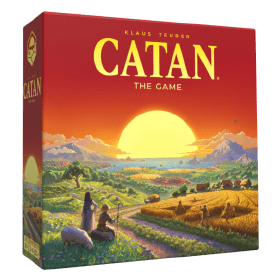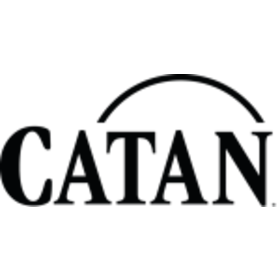CATAN The Settlers of Catan, Die Siedler von Catan, Les Colons de Catane
 Voor het eerst in 1995 in Duitsland gepubliceerd als Die Siedler von CATAN, daarna in 1996 in het Engels als The Settlers of CATAN, vierde CATAN in 2020 zijn 25e verjaardag.
Voor het eerst in 1995 in Duitsland gepubliceerd als Die Siedler von CATAN, daarna in 1996 in het Engels als The Settlers of CATAN, vierde CATAN in 2020 zijn 25e verjaardag.
Om het spel te beginnen, bouw je het spelbord op met hexagonale terreintegels. Catan wordt geboren - een mooi eiland met bergen, weiden, heuvels, akkers en bossen, omringd door de zee.
Ieder van jullie plaatst twee kleine huizen op plekken waar drie terreintegels tegen elkaar liggen. Dat zijn jullie begindorpen.
En zo begint het. De startspeler werpt twee dobbelstenen. Een "11"! Elke terreintegel is gemarkeerd met een getal. Elke speler die een dorp bezit grenzend aan een terreintegel gemarkeerd met het geworpen getal ontvangt een grondstof die door deze tegel wordt geproduceerd. Heuvels produceren klei, bossen produceren hout, bergen produceren erts, akkers produceren graan en weiden produceren wol.
Je gebruikt deze grondstoffen om uit te breiden in Catan: je bouwt wegen en nieuwe dorpen of waardeert je bestaande dorpen op naar steden. Een weg kost bijvoorbeeld 1 steen en 1 hout. Als je de nodige grondstoffen niet hebt, kun je deze verkrijgen door te handelen met je tegenstanders.
Elk dorp is 1 overwinningspunt waard en elke stad is 2 overwinningspunten waard. Als je slim uitbreidt, ben je misschien de eerste speler die 10 overwinningspunten behaalt en zo het spel wint!
Aantal spelers: 3 - 4
Spelduur: 36 mn
Complexiteit: 2 / 5
Speel CATAN en 1229 andere spellen online.
Geen download nodig - speel rechtstreeks in je webbrowser.
Met je vrienden en duizenden spelers van over de hele wereld.
Gratis.

Speel CATAN en 1229 andere spellen online.
Geen download nodig - speel rechtstreeks in je webbrowser.
Met je vrienden en duizenden spelers van over de hele wereld.
Gratis.


